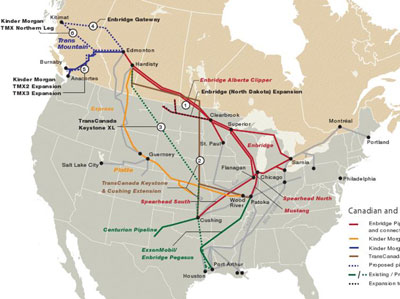Update June 10:
The Minnesota Public Utilities Commission unanimously granted a certificate of need to Enbridge for its $2.6 billion Sandpiper pipeline project.
About 5000 people showed up for the march.
—-
On June 6 – this Saturday – the Midwest will get its version of the Peoples’ Climate March, where over 400,000 people gathered this fall in NYC.
The Tar Sands Resistance March will be held in St. Paul, Minnesota to protest much more than the Keystone pipeline – which has become one spoke in a very big wheel. It protests the growing spiderweb network of pipelines, refineries and terminals planned for the Great Lakes region (and elsewhere) – and all the associated trains and even tankers.
There’s so much tar sands infrastructure planned it’s becoming difficult to keep track. This week, for example, Minnesota’s Public Utilities Commission will hear arguments about a "Certificate of Need" for the Sandpiper pipeline, which would carry tar sands from Alberta across northern Minnesota’s lake country – a new energy corridor!
And this is with oil prices so low that 39 tar sands projects are on hold, according to Oil Change International.
Even in Michigan, Enbridge, responsible for the Kalamazoo River tar sands spill, got approval to double the tar sands oil it brings into the US through its Alberta Clipper pipeline. Regulators say it’s better than trains, but research shows it’s not.

In the US, the oil pipeline network is almost 25% bigger than it was 10 years ago, says Associated Press. Local groups have been fighting each one, sometimes delaying projects, but mostly not.
"During the long wait for Keystone, the petroleum industry has pushed relentlessly everywhere else to get oil to market more efficiently, and its adversaries have been unable to stop other major pipelines," says Associated Press.
And this is at a time when the number of federal inspectors are at all-time lows because of federal budget cuts.
Bribery Doesn’t Work, How About No Oil Here!
In Canada, no one expected this infrastructure to be blocked at every turn, but that is what’s happening, forcing companies and governments to offer bribes and even give promises they may not keep.
Before he was ousted last month, Alberta’s Premier tried to convince First Nations to sign a pact where they would lobby for the very tar sands pipelines they oppose in exchange for revenues from oil and gas, reports The Guardian. Their job would be to get other First Nation tribes on board, even convincing them to drop their lawsuits.
And it extends beyond tar sands to natural gas.
In British Columbia (BC), the Lax Kw’alaams Band rejected a $1 billion payment from Malaysia-based Petronas to support its planned liquefied natural gas (LNG) terminal near their remote community. The provincial government – which wants a natural gas industry – offered them more land, but that didn’t work either. They rejected it because it would harm fish habitats, particularly salmon.
Also in BC, TransCanada’s plan to convert natural gas pipelines to carry tar sands oil instead, encountered so much resistance that they signed pledges promising they would only transport gas. That made all the difference for BC’s Kitselas First Nation, which then agreed. "If a gas line breaks, it’s going to add to greenhouse gases, let’s not kid ourselves, but it’s less intrusive than oil," Chief Councillor Joe Bevan told Bloomberg.
Pretty much every tar sands pipeline in Canada is blocked by a coalition of indigenous groups, environmental activists and municipalities – from Alberta to the Pacific Coast; and even Energy East, which was viewed as a shoe-in, has been delayed for two years.
The last route to be exhausted is from Alberta to the Arctic. Once it reached the Arctic by pipeline, the oil would be transferred to tankers, where it could be exported to the Atlantic or Pacific oceans. "This will be a revolution in global logistics, equal in impact to the opening of the Suez or Panama canals," says a report commissioned by Alberta.
All this leaves Alberta’s plans for rapid, extensive tar sands expansion very much up in the air.
Find out more about the Tar Sands Resistance march:

